| Srl | Item |
| 1 |
ID:
132706
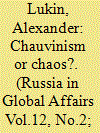

|
|
|
|
|
| Publication |
2014.
|
| Summary/Abstract |
Instead of chauvinism and chaos Russia needs a third alternative. And that is a combination of moderate patriotism and moderate liberalism manifesting itself in the commitment to freer life by law, without corruption, but with mature self-government.
|
|
|
|
|
|
|
|
|
|
|
|
|
|
|
|
| 2 |
ID:
132710
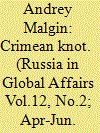

|
|
|
|
|
| Publication |
2014.
|
| Summary/Abstract |
Russia will have to deal with the effects of Crimea being part of an independent Ukraine for 23 years. A Crimean political and business elite has emerged with its own values, bonds, and relationships. Russia is not the motherland of an entire generation of Russian-speaking youth, but the motherland of their ancestors.
|
|
|
|
|
|
|
|
|
|
|
|
|
|
|
|
| 3 |
ID:
132705
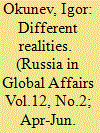

|
|
|
|
|
| Publication |
2014.
|
| Summary/Abstract |
The new post-Crimean risk for Russia's political system is not so much in putting political participation on freeze as in forcing this participation, which might push the country onto the road to ideology-driven authoritarianism.
|
|
|
|
|
|
|
|
|
|
|
|
|
|
|
|
| 4 |
ID:
132709
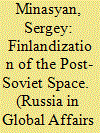

|
|
|
|
|
| Publication |
2014.
|
| Summary/Abstract |
Armenia, opting for self-restraint of its own accord, minimized its risks and losses. As to whether the Armenian-style Finlandization can be an example for other former Soviet republics would depend not only on their own choice.
|
|
|
|
|
|
|
|
|
|
|
|
|
|
|
|
| 5 |
ID:
132824
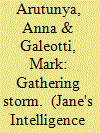

|
|
|
|
|
| Publication |
2014.
|
| Summary/Abstract |
As separatist militias mount an active insurgency in eastern Ukraine, the crisis is set to continue. Anna Arutunyan and Mark Galeotti examines Russia's role, emerging groups, and government attempts to contain the violence and regain control
|
|
|
|
|
|
|
|
|
|
|
|
|
|
|
|
| 6 |
ID:
132712
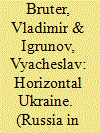

|
|
|
|
|
| Publication |
2014.
|
| Summary/Abstract |
The participation of Donetsk representatives in the government corresponds to the "horizontal principle," but domination does not. There will be neither real reform nor a modern and efficient state in Ukraine unless regions feel that they are equal.
|
|
|
|
|
|
|
|
|
|
|
|
|
|
|
|
| 7 |
ID:
133994
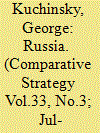

|
|
|
|
|
| Publication |
2014.
|
| Summary/Abstract |
Russia's current system of government is weakening. Putin's annexation of Crimea only masks this underlying trend. The system remains centered around Putin. Putin has effectively eliminated individual and institutional political rivals. But public criticism has become more diffuse and hard to neutralize. The impact of public opinion on driving the political process is growing and the opposition is expanding and coalescing. This is manifested through multifaceted forms of dissent and the growing influence of opposition leader Aleksey Navalniy. The dissent, which was initially fueled by prominent opinion makers, evolved into sporadic protests in key urban centers and political campaigns. Why did people who used to support Putin or were apathetic become critical to the point of speaking out and even engaging in opposition activity? The most likely catalyst was the 2008-2009 financial crisis. It undermined Putin's longstanding argument that an authoritarian system, with him at the helm, was necessary for economic advancement. Beyond economics alone, resentment is driven more generally by state incapacity-incapacity to strengthen the social safety net, improve public services, and effectively address corruption; violent crime; natural disasters; and terrorism-which increasingly contrasts Putin's stability narrative. Credible estimates and public perceptions indicate that corruption levels today exceed even those of the turbulent 1990's. Russia's leadership is known to be the key driver and beneficiary of this trend, which is also an important component that fuels discontent. The opposition has not organized into a political party and the government temporarily bolstered its popularity through outside intervention. This makes it hard for the opposition to dislodge Putin and for Putin to contain the opposition, which is creating an impasse. Russia is likely to be increasingly characterized by volatility-internally and on the international stage. This volatility positions the U.S. and the European Union to have greater influence on Russia but it's important for the West to understand how to take advantage of its already substantial leverage.
|
|
|
|
|
|
|
|
|
|
|
|
|
|
|
|
| 8 |
ID:
134095
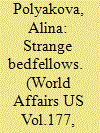

|
|
|
|
|
| Publication |
2014.
|
| Summary/Abstract |
The courtship between Eastern European far-right parties and Russia has been going on for years, of course. In 2008, Eastern Europe's far right supported the Russian war against Georgia. In May 2013, leaders of Jobbik, the Hungarian far-right party with dubious fascist origins, met with Russian Duma leaders and academics at Moscow State University. The neo-Nazi Bulgarian Ataka party has vocally supported Putin and Russian foreign policy. In 2012, Ataka's leader, Volen Siderov, traveled to Moscow, reportedly at his own expense, to celebrate Putin's sixtieth birthday and express admiration for the Russian president's strong leadership. After Russia's annexation of Crimea, Siderov threatened to withdraw his party's support from the coalition government if it supported further sanctions against Russia.
|
|
|
|
|
|
|
|
|
|
|
|
|
|
|
|
| 9 |
ID:
133757
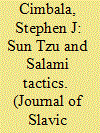

|
|
|
|
|
| Publication |
2014.
|
| Summary/Abstract |
Vladimir Putin used a composite of ancient and modern methods of military persuasion in first destabilizing, and then annexing, Crimea in February and March of 2014. Putin's use of military persuasion through Russian and proxy forces enabled him to annex Crimea and to set the stage for further imposition of Russia's will on Ukraine's eastern provinces. Russia's determination to resist excessive Westernization by Ukraine, especially the possibility of Ukrainian membership in NATO, exceeded the willingness of the U.S. and its allies to reverse Putin's gains in Crimea.
|
|
|
|
|
|
|
|
|
|
|
|
|
|
|
|
| 10 |
ID:
132088
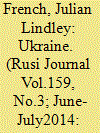

|
|
|
|
|
| Publication |
2014.
|
| Summary/Abstract |
As NATO prepares for the Wales Summit in September, the crisis in Ukraine and the resultant tensions with Russia have changed the geostrategic context in which the Alliance operates. Julian Lindley-French steps into the Russian mindset to analyse the motivations behind the country's assertive behaviour, and argues that it is vital that the West does the same.
|
|
|
|
|
|
|
|
|
|
|
|
|
|
|
|
| 11 |
ID:
132997
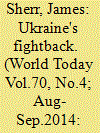

|
|
|
|
|
| Publication |
2014.
|
| Summary/Abstract |
Military manoeuvres took the Kremlin by surprise but the government has a mountain to climb. To those who accept Vladimir Putin's view of Ukraine as an artificial state, the routing of pro-Russian insurgent from their stronghold in Slavyansk on July 5 might have come as a shock. It certainly appears to have surprised the Kremlin.
|
|
|
|
|
|
|
|
|
|
|
|
|
|
|
|
| 12 |
ID:
134093


|
|
|
|
|
| Publication |
2014.
|
| Summary/Abstract |
The Obama administration seems to believe that Vladimir Putin should not be taken too seriously. The annexation of Crimea and belligerence over Ukraine are, to quote the president and his secretary of state, a sign of "weakness," the hallmark of a "regional" power stuck in "the old ways of doing things," leading no bloc of nations and having "no global ideology." These assumptions may be comforting rationales for a lack of response to the Kremlin's recent moves, but they misread the game Putin is playing-and underestimate its significance.
|
|
|
|
|
|
|
|
|
|
|
|
|
|
|
|